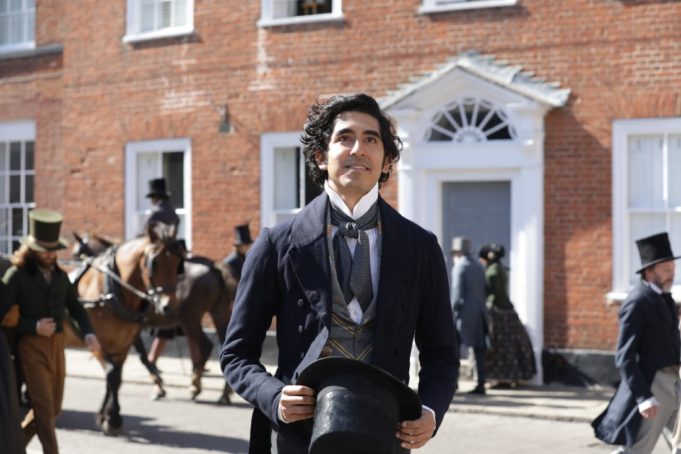I had all these complex theories about why there are so few good film versions of Charles Dickens’ novels. Then I saw The Personal History of David Copperfield, and it convinced me that I was overthinking everything (something I do from time to time). With the notable exception of A Tale of Two Cities, Dickens’ books are funny. Filmmakers seem to forget this; they have no problems finding the comic side when they adapt Jane Austen, but when it comes to Dickens, they lose their sense of humor. Thus we have forgettable stuff like Douglas McGrath’s 2002 Nicholas Nickleby and Roman Polanski’s 2005 Oliver Twist and Alfonso Cuarón’s regrettable modernized version of Great Expectations.
The Personal History of David Copperfield, whose lengthy title reflects the even longer title of Dickens’ book, doesn’t have this problem because it’s in the hands of Armando Iannucci, the scathing British political satirist who writes foul-mouthed invective for TV series such as The Thick of It and Veep as well as films In the Loop and The Death of Stalin. He can’t use his formidable arsenal of obscenities here in this PG-rated film — it must have killed him to have a character named Mr. Dick and not be able to make penis jokes about him. Nevertheless, he knows where the laughs are, and that helps make his movie a standout in an undistinguished field.
Dev Patel plays David, a 19th-century man born to impoverished gentility in Suffolk who runs away from an abusive home to a rich aunt in Dover (Tilda Swinton) who gives him an education and a profession as a proctor, which he excels at without ever figuring out what the job actually is. His true calling is as a writer, and much like Charles Dickens, he spends his time writing down turns of speech that he overhears in London or on England’s southern coast. It’s going to work for him, too, because the movie’s framing device is one of David giving a reading from his book to a packed theater.
Back in December when I reviewed The Aeronauts, I touched on why I think the British do colorblind casting wrong. This film has given me a better handle on that. It makes sense that an Asian actor portrays David, an outsider who initially tries to play by the business world’s rules and only finds himself when he steps outside that world to chronicle it. For the same reasons, a Black actress playing Agnes (Rosalind Eleazar) isn’t an issue. However, casting Benedict Wong as the alcoholic business manager Mr. Wickfield and a Black actress (Nikki Amuka-Bird) as the rich snob Mrs. Steerforth makes 19th-century Britain look like a far more tolerant and equal place than it actually was. The film could have avoided this pitfall by casting all actors of color, or only the younger characters with them. Compare this to Mira Nair’s 2003 film of Vanity Fair and Kenneth Branagh’s recent adaptation of Murder on the Orient Express, which both introduce Black characters into period settings and have the gumption to treat their race as an issue. Colorblind casting isn’t always doomed to fail; Shakespeare adaptations, with their archaic language, are significantly removed from our reality that it can work. Even so, when I see a film like this one, it reminds me of those white people who say they don’t see color. I see it everywhere. It’s one of the reasons why I’m good at this job.
Rather than aim for a realistic depiction of Victorian London, Iannucci leans into the theatricality of the conceit. Even when David is walking on a windswept beach, it somehow looks like a set. At one point, the wall of a London slum peels back to reveal a stormy coastline to which David has traveled. This is the backdrop for some nice comic set pieces such as the hilariously callous way in which David is informed that his mother (Morfydd Clark) has died. His aunt learns that a maid is named Peggotty (Daisy May Cooper) and asks, “Did your mother sneeze during your christening?” My favorite piece of metafiction comes when David’s dingbat fiancée Dora Spenlow (also played by Clark) suddenly materializes in a climactic scene with no logical explanation for how she got there and realizes that she’s out of place in the entire film.
Much like Austen’s novels, Dickens’ are a treasure trove of outsized supporting comic roles. Hugh Laurie cannily underplays the aforementioned Mr. Dick as a mentally troubled man obsessed with the execution of King Charles I some two centuries prior. Iannucci mainstay Peter Capaldi plays Mr. Micawber, and while he doesn’t erase memories of W.C. Fields (perfectly cast in this role in George Cukor’s 1935 film), he captures the charlatan’s orotundity and genial optimism in the face of dismal prospects. Ben Whishaw is effectively cast against type as the loathsome toady Uriah Heep, and Aneurin Barnard lends a note of deep self-loathing to David’s school friend James Steerforth, whose tragic death at sea gives the story its gravitas. In a showcase role, Patel proves equally capable as the dashing hero, the butt of a joke, and the clown who does comic impersonations of the people around him. Along with the director’s tone, these performances send a signal to the next filmmaker who wants to adapt Dickens: Lighten up.
The Personal History of David Copperfield
Starring Dev Patel. Directed by Armando Iannucci. Written by Armando Iannucci and Simon Blackwell, based on Charles Dickens’ novel. Rated PG.










